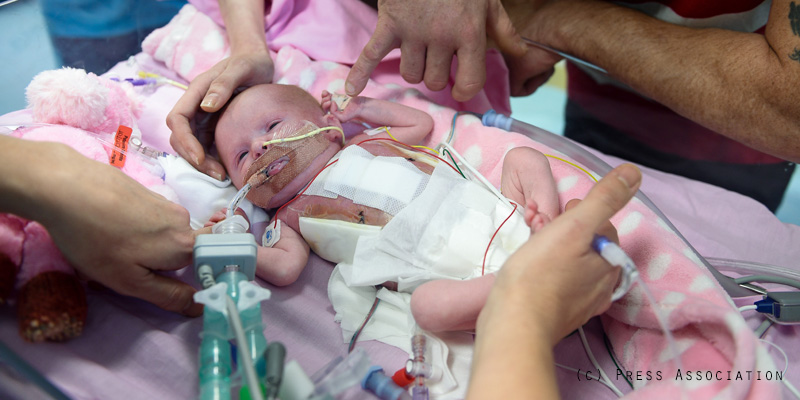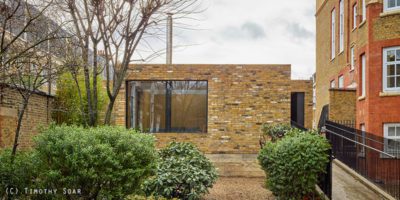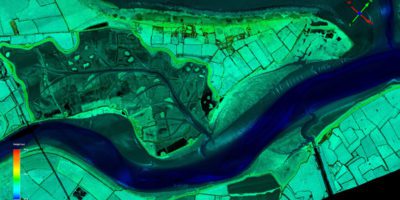Dr. Frances Bu’Lock is a consultant paediatric cardiologist at the East Midlands Congenital Heart Centre in Leicester, where she currently leads the fetal cardiology service. She recently worked as part of a team of 50 doctors and midwives, including obstetricians, cardiac surgeons, anesthesiologists and neonatologists, to treat Vanellope Hope Wilkins, a baby delivered by caesarean section several weeks prematurely who had a rare congenital condition called ectopia cordis, which meant her heart grew outside her chest cavity. Frances qualified at Cambridge and Oxford, and trained in congenital cardiology in Bristol, Birmingham and Liverpool children’s cardiac units.
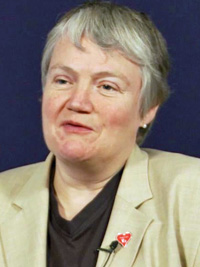
“…The living three-dimensional jigsaw puzzle that is most of diagnosing and treating congenital heart disease has never lost its fascination, and the personal interactions with both children and adults, through what can be really challenging life journeys, are a real bonus…”
Choosing cardiology
I went to Clare College, Cambridge and then the John Radcliffe Hospital in Oxford to study medicine. The heart was really the bit of medicine I not only found most fascinating but easiest to make sense of; it’s quite logical and also three dimensional.
I didn’t have much experience of small children and was surprised when I enjoyed my paediatrics training. There was a female paediatric cardiologist (Inga Ostman-Smith) in Oxford when I was training who definitely encouraged and inspired me too. I found the fact that you could look at the live, beating heart, from the outside, using what was quite early ultrasound, fascinating, and have never really looked back.
The living three-dimensional jigsaw puzzle that is most of diagnosing and treating congenital heart disease has never lost its fascination, and the personal interactions with both children and adults, through what can be really challenging life journeys, are a real bonus.
My role on a day to day basis
I am lucky in that I have a very varied job. I trained in cardiology in both children and adults, and then we learnt that we could also look at unborn babies with congenital heart problems as well. So, I do a mixture of fetal, paediatric and adult congenital cardiology, which is quite unusual these days as quite a few people tend to focus on smaller areas.
I am involved in making the diagnosis; providing information to parents and patients, and also to my colleagues, who can undertake the physical interventions like surgery or keyhole procedures. I’ve never done much surgery, although I did quite a lot of catheter interventions (keyhole procedures) previously, but you can’t do everything for ever so I leave that to others now.
A lot of the fetal work is essentially talking to prospective parents to provide information and choices at a level that’s right for each family, and working with obstetric and fetal medicine and neonatal paediatric colleges to ensure that the babies and families have the right management and support in place.
Dr Frances Bu’lock was one of a team of 50 to help deliver baby Vanellope who is thought to be the first in the UK to survive being born with her heart outside her chest. https://t.co/MoLbTkUfZ1 pic.twitter.com/ELuw6lOVCe
— Victoria Derbyshire (@VictoriaLIVE) December 13, 2017
I cover inpatient care, working with my surgical and intensive care colleagues providing 24/7 support. I also do outpatient clinics all around the East Midlands, so I spend quite a lot of time in the car.
I have spent ridiculous amounts of time fighting to keep our unit open over the last several years; I have very strongly believed that losing the expertise in our centre while requiring patients from the East Midlands to have to travel much further afield for their treatment, was wrong. So, it’s been necessary to challenge what seemed to be endless, serial ‘reviews’. Hopefully this is now achieved and I will now have a lot more time to concentrate on actually doing the ‘day job’ as well as service development and building our research and academic profile.
I have managed to keep some research going, despite the external pressures. This has been mainly looking at the genetic causes of congenital heart disease and this is slowly providing enlightenment on the mechanisms by which it occurs. It’s a long way from preventing it or helping us treat it at the moment but obviously that would be a key long-term aim.
Looking after my patients, supporting their choices and sharing their life journeys
I am lucky to look after a wide variety of patients and their families. Some of my patients are really quite elderly and had their initial heart surgery in their teens or twenties (once open-heart surgery was actually invented!). They are real ‘survivors’ and it’s a rare privilege to share their life stories. It also informs what can be possible for our newest patients, those yet to be born, when I am trying to tell their parents what their lives might be like.
The outlook for people with congenital heart problems has altered dramatically through my career and keeping up with the changes so as to provide people with realistic expectations is key. We always have to remember there are those that we may not be able to help, as well as those for which the struggle will be huge, and parents need to understand the options and choices in ways that are practical and relevant to them. They also need to understand that we will support them, whatever choices they make.
Sharing in the life journeys of our patients and their families is hugely rewarding; many have come through huge challenges, so seeing them grow and achieve is a real privilege. Helping families come to terms with loss or major complications of their condition so that it doesn’t blight the whole of their lives is also rewarding, but harder to do well.
Gender balance in cardiology
In paediatric cardiology the gender balance is pretty good; many of our trainees come from paediatrics and therefore there is a good pool of young, keen and able women who are drawn in. I don’t actually think it matters what gender you are for most of what we do, but it’s a very intense speciality, which is hard to do part time however, and not all of our trainees stay the course to ‘consultanthood’.
The gender balance in acquired ‘adult’ cardiology is much less favourable in what has historically been a pretty ‘macho’ speciality and this certainly concerns me. There is still some difference in the way women doctors are viewed and treated, especially in high pressure settings like the operating theatre and the catheterisation laboratory, not just by doctors but also by more female dominated healthcare professionals and this can be quite a challenge.
Advice to girls and women who are interested in cardiology careers
Cardiology is a fascinating speciality and the possibilities are endless… It’s a high technology speciality so you need a bit of an aptitude for that and also a good three-dimensional spatial awareness. You also need tenacity, the ability to speak up, quite a lot of personal flexibility and the will to work.
Future advances in cardiology
For my speciality area I think the real advances are in the areas of imaging; the three and four-dimensional images that we can now get with ultrasound as well as CT [computerised tomography] / MRI [magnetic resonance imaging].
Patients are also benefiting from advances in bio-engineering; I’m ever hopeful that one day before too long we will be able to grow our patients new valves or even new hearts that are biocompatible and durable, to avoid the repeated surgeries and procedures that many currently require.
Coming up next
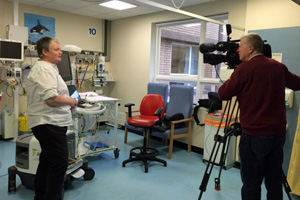
For me, the next challenges are getting the children’s part of the East Midlands Congenital Heart Centre into top quality new facilities on the same hospital site as the rest of children’s services in Leicester. This is going to have to be at the Leicester Royal Infirmary, which is going to be quite a big challenge. It’s going to cost a lot of money to do really well, so we need to raise as much charitable funding as possible, as well as yet more support from our patients and families. You can find out more about how to support our fundraising campaign by clicking here.
I’m also just starting out as Chair of our national Speciality Advisory Committee (for training in congenital cardiology) and we have a whole new training curriculum to write, which will be a challenge. I would also like to actually get a bit more proper research and scientific writing done so I think I’m going to be quite busy.
http://www.eastmidlandscongenitalheart.nhs.uk
https://twitter.com/Leic_hospital

